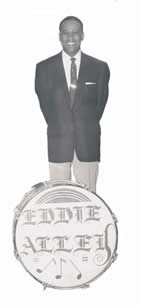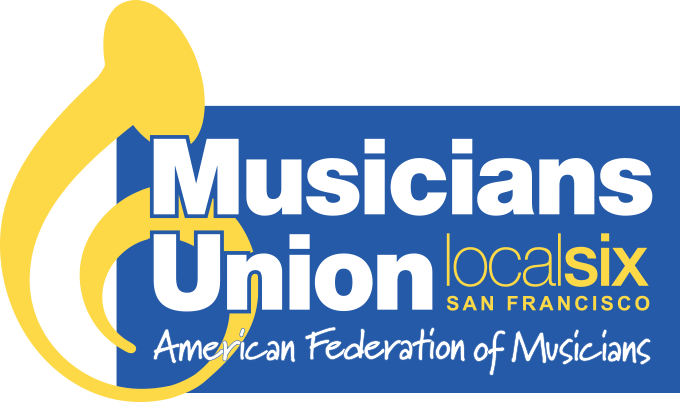 EDDIE ALLEY — A LIFE OF FIRSTS
EDDIE ALLEY — A LIFE OF FIRSTS
by Alex Walsh
On February 18, 2003, I had the honor of meeting Eddie Alley. And WHO is Eddie Alley? Eddie Alley is the happiest man I know. Eddie Alley has a laugh that cracks me up. Eddie Alley laughs A LOT.
You might have heard of Vernon Alley, the world-famous bass player. Well, Eddie is his older brother.
Eddie Alley is a drummer.
Eddie Alley is a bandleader.
Eddie Alley is a family man.
I’m sitting in Eddie’s living room with the tape recorder running. It’s a clear day and through the picture window we have a great view of the Faralons. There are pictures on the wall, framed pictures of Eddie and his wife, his four children, Eddie on the bandstand, Eddie meeting the Pope.
Eddie started his career by playing rhythm with sticks and knives when he was a kid. When his grammar school decided to have a band program, Eddie won the drum position hands down because of his rhythm.
Folks, this was way back when, back when schools were starting music departments, not ending them. Eddie Alley is NINETY-TWO.
“92? Eddie, why are you so old?”
(Loud laughter) “’Cause I didn’t drink or smoke. (Pause) And being a musician that’s very rare.” (More laughter).
Eddie Alley was born in 1910 in Minneapolis, MN. His parents moved to the Bay Area right after World War One, and settled in the Potrero Hill district of San Francisco. He went to Daniel Webster grammar school and then Polytechnic High School, which was located across from Kezar Stadium (later moved and renamed McAteer).
As a kid, Eddie wasn’t aware of racism.
“We always lived in integrated neighborhoods.” He says. ”We didn’t know anything about racism…we were always integrated all our lives. We never had any chips on our shoulders or anything like that. And we always got along with other people because we didn’t know any different. We didn’t come across anything that was negative in our lives, like the kids from the South did.”
During his high school years, Eddie did not play music, or participate in sports (although the coach said he could have been a track star). His parents had separated, and being the oldest, Eddie worked everyday after school shining shoes down on Geary and Larkin Street to help his mother financially. In 1929, on the day of the crash, Eddie Alley graduated from high school.
Through a family friend, Eddie got his first real job as a bus boy at Topsy’s Roost, a unique and popular restaurant at Ocean Beach, down the street from the Cliff House, in San Francisco. “The drums did not even enter my mind,”says Eddie,”I was scuffling.”
But Eddie had a good singing voice, and was soon singing a few numbers with the house band, Red Lockwood. When Eddie told his boss he could play drums, he was asked to set up his drums and play along with phonograph records so people could dance before the big band came on, which they did.
Enter the Musicians Union: “They told me if you’re going to play drums, you have to join the union,”says Eddie,”I didn’t know what a union was.”
At that time, to join the Musicians Union, musicians had to pass an exam. To prepare, Eddie went to school at the Golden Gate School of Music. He passed and joined the Union in 1930.
“In those days it was hard,” says Eddie, “There was discrimination in those days. We ran into it later on, Vernon and I did, because in those days they had two unions, 669 (black) upstairs and local 6 (white) downstairs…we didn’t like that.”
It was hard for black musicians to advance their careers because they could not play east of Van Ness. But ¾ people LIKED Eddie. People always liked Eddie. At the protest of Local 6 (the white union), club owners demanded that Eddie be allowed to play in their clubs. He was.
During the 1930’s Eddie worked all over the Bay Area, and eventually played all the top jazz clubs in Northern California, like the Eureka club in Sacramento. He played gigs with Charles Mingus, and Billie Holiday. He also played Reno show gigs, complete with dancers and singers. “That was a good experience for me,” He recalls. Back in San Francisco in 1937, Eddie met his wife, Dorothy. In 1939, they were married.
At this time, Eddie was making $110 a month. “I needed a day job,” says Eddie, ”I knew I wasn’t going to be a full-time musician. It was too hard, and I wanted to raise a family. So I got a job at the Metropolitan Life Insurance Company, and broke the ice down there.” (Laughs)
Eddie was hired as an elevator operator and was told he would never advance in the company because he was black. Eddie changed all that. After a few years, he applied for a job as a clerk in the payroll division, and got it. Eddie worked for Metropolitan Life for 38 years. He became the first black supervisor of his department. When he retired in the 1970’s, Mayor Moscone came to his retirement party.
Eddie played music at night and on the weekends. He led his own band: ‘Eddie Alley & the Gentlemen of Rhythm’. “I was always first class,” says Eddie. “I had the best musicians. We played music so people could dance.” His band was the first black band to play in the big downtown hotels.
Eddie’s band became the “must hire” band for High Society occasions. People were loyal. Scott Newhall, Editor of the San Francisco Chronicle, insisted that he wanted Eddie’s band to play for his party in Newhall, California, near LA.
“But there are plenty of good bands down there,” protested Eddie.
Mr. Newhall insisted, he wanted EDDIE. So they flew his combo down, and it was so successful they invited him back the next year.
“I was never a failure with music, “Says Eddie, ”I was never a big name like my brother, but the things I did do, I was very successful at it.”
Eddie played for two presidents, Kennedy (before he was elected) and, later, Carter.
Eddie’s day job gave him the stability to buy a house and raise his four kids. Even as a part time musician his reputation grew ¾ he played with all the top players that came through town. People like Dizzy Gillespie became his friends. Eddie says they would spend the day at his house, roll around on the floor with his kids. For an afternoon, Eddie could give them the family life they never had.
Eddie says the secret to his success is that he was always honest in everything he did. His reputation as a straight up bandleader was reinforced when the AFM Pension program started. “Alot of the leaders were pocketing the pension money, not reporting it,” he says,”Not me. One year a musician told me he kept records of every gig he did with me. At the end of the year he checked it and it wasn’t a penny off.” (Laughter)
Along with working, raising a family, his church, and performing, Eddie became a contractor for the big artists that toured through the bay area. He booked the big bands for singers like Tony Bennett, Gene Kelly, Nelson Riddle, Gladys Night & the Pips, Jack Jones, and Sammy Davis, Jr. “Jimmy Schlicht helped me alot with that,” Eddie recalls. By this time the black and white unions had finally merged.
But Eddie’s experience of racism did not end there. In the 1980’s he was called for a gig on the Peninsula. When the lady of the house answered the door, she took one look at him and his band and slammed the door in his face. But in the end, Eddie prevailed. By the time the gig was over the lady was bowing at his feet and he received referrals for several more gigs.
Eddie is a huge Giants fan. For years he played for the Giants at Candlestick Park where he became the first black bandleader. “Most of the musicians would leave after they finished,” says Eddie,”I always stayed and watched the games.” Eddie became good friends with Hall of Fame first base player Orlando Cepeda. These days Orlando picks Eddie up and brings him to the games.
Eddie retired from music two years ago. His last gig was at the top of the Bank of America building. He was 90.
For the rest of the interview we listened to tapes of Eddie Alley & the Gentlemen of Rhythm, recorded live from the bandstand in the 1980’s.
Among Eddie’s closest and dearest friends were/are Earl Watkins (Eddie knew Earl from his early childhood. Eddie’s drums were the first drums that Earl played upon). Ben Webster, Poppa “Jo” Jones, Dizzy Gillespie, Harry “Sweets” Edison, Marshall Royal, Ernie Royal, Ray Brown, Oscar Peterson, Ed Thigpen, Clarke Terry, Willis Kirk, Count Basie, Laurence Brown, Grover Mitchell, Errol Garner, Earl Grant, Saunders King, Johnny Cooper, Red Callender, Lee Young, James Moody, Gerald Wiggins, Buddy Collett, Curtis Mosby, Les Hite, and Curtis Lowe.
Eddie played locally with Larry Vuckovich, Noel Jewkes, Bryce Rohde, Terry Hilliard, Shota Osabe, Bill Bell, Pee Wee Claybrook, Waldo Carter, Doug Rinnard, Allen Smith, Eddie Walker, Sweetie Mitchell, Mary Stallings, Wyatt Ruther, Jules Broussard, and many others including Buddy Rich, John Handy, Wesley Peoples, and of course Eddie’s brother, Vernon Alley.
(Eddie Alley passed away in November of 2005)
